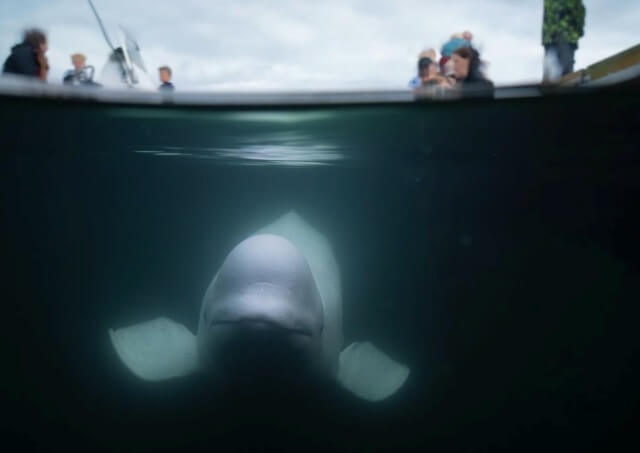It is always sad when a vibrant life comes to an end. But it was a shock to learn of the death of Hvaldimir, the friendly beluga whale who had been hanging out along the coast of Norway for more than five years and enchanting everyone who saw him.

Photo of Hvaldimir by marinemind.org
Hvaldimir was wearing a leather harness when he first approached a fishing boat in April 2019. The harness had a camera mount and the words “Equipment St. Petersburg” on the buckle. It seemed likely that the whale was a military conscript from the Russian navy who had somehow gone AWOL.
When one of the fishermen got into the water, the 14-foot, 2,700-pound whale allowed him to remove the harness and then followed another boat to the fishing and tourism town of Hammerfest.
He quickly made a new life for himself along the Norwegian coast.Most captive whales are born in captivity and have never learned how to survive in the ocean. But Hvaldimir was different. He had clearly been born and raised by his family in the ocean. And once free of his captors, he quickly made a new life for himself along the Norwegian coast, often dropping in on harbors, sometimes taking off for days or weeks by himself. And while there were some people who wanted to relocate him further north to where there are many more ocean-going belugas, or to net off a fjord and keep him in it, scientists and other whale experts advised simply leaving him be. He had, after all, made it clear how he wanted to lead his life, and he was quite capable of feeding himself.
But on September 2nd, we learned that Hvaldimir had been found dead in Norway’s Risavika Bay, near the historic town of Stavanger.
The police have stated that the preliminary results from the veterinary institute indicate a 35 cm long stick was found in Hvaldimir’s mouth. He had no food in his stomach, and his internal organs were degraded.
We are awaiting the full report from the veterinary institute. We are aware that extensive samples have been taken and sent for further analysis and we anticipate that the laboratory and histopathology results will help identify all the factors that contributed to his death.
During his life, Hvaldimir touched the hearts of thousands of people around the world who recognized the dignity and courage of someone who made his own choices in life and lived every minute to the fullest.
Rest in peace.
For a full recounting of the story of Hvaldimir, see the feature article “The Whale Who Went AWOL” by journalist Ferris Jabr in the New York Times Magazine on February 12th, 2024.